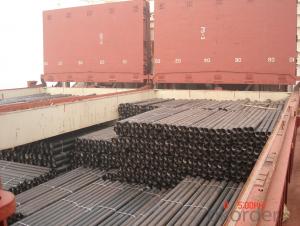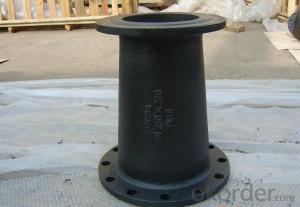DUCTILE IRON PIPE DN1000 K8
- Loading Port:
- China Main Port
- Payment Terms:
- TT OR LC
- Min Order Qty:
- -
- Supply Capability:
- -
OKorder Service Pledge
OKorder Financial Service
You Might Also Like
Specification:
1) The standard of pipe: ISO2531:1998, K9
2) Effective length: 6m
3) Inner cement line: Portland cement line as per ISO4179
4) Zinc coating: at least 130g/m2 as per ISO8179
5) Bitumen painting: at least 70um as per ISO8179
6) With 100% quantity of NBR ring, or SBR ring, or EPDM ring as per ISO4633
7) DN80mm-800mm
8) High strength, lighter than grey iron, good corrosion resistance, no furring, small flow resistance, easy fixing, long life tome about 100 yeas
9) Produced by Hangzhou chunfeng machine
10) Checked by automatic inspection equipment
11) Composition:
Chemical composition | | | | |||
Chemical composition | Ductile Cast Iron Pipe (%) | Grey iron pipe (%) | Steel pipe (%) | | | |
C | 3.5-4.0 | 3.2-3.8 | 0.1-0.2 | | | |
Si | 1.9-2.6 | 1.4-2.2 | 0.15-0.4 | | | |
Mn | 0.15-0.45 | 0.4-0.6 | 0.3-0.6 | | | |
P | ≤0.06 | ≤0.3 | 0.02-0.03 | | | |
S | ≤0.02 | ≤0.1 | 0.02-0.03 | | | |
Mg | 0.03-0.06 |
|
| | | |
12) Feature:
Mechanical properties | | | | |||
| Ductile Cast Iron Pipe | Grey Iron Pipe | Steel Pipe | | | |
Tensile Strength(Mpa) | ≥420 | 150-260 | ≥400 | | | |
Yield Strength(Mpa) | ≥300 | No Confirmation | No Confirmation | | | |
Bending Strength(Mpa) | ≥590 | 200-360 | ≥400 | | | |
Elongation (%) | ≥10 | Neglected | ≥18 | | | |
Brinell Hardness(HBS) | ≤230 | ≤230 | About 140 | | | |
13) T type mechanical joint
14) Packing: in bulk or container
- Q:Can ductile iron pipes be used in tunneling or microtunneling projects?
- Tunneling or microtunneling projects can utilize ductile iron pipes. These pipes possess strength, durability, and flexibility, making them appropriate for underground applications. They can endure the external pressure from the surrounding soil or rock during tunneling, guaranteeing the project's integrity and safety. Furthermore, ductile iron pipes exhibit exceptional corrosion resistance, a vital characteristic for tunneling projects where the pipes are exposed to moisture and other corrosive substances. Moreover, their internally smooth surface facilitates the fluid or material flow through the pipes, rendering them an optimal selection for tunneling or microtunneling projects.
- Q:Are ductile iron pipes suitable for pressure reducing valve stations?
- Ductile iron pipes prove to be suitable for pressure reducing valve stations due to their strength and durability, making them an ideal choice for applications involving high pressure. Pressure reducing valve stations, which regulate and decrease the pressure of a fluid or gas in a pipeline system, can rely on ductile iron pipes to handle the exerted pressure, ensuring an efficient and reliable operation. Moreover, the excellent resistance to corrosion exhibited by ductile iron pipes is crucial in upholding the integrity of the pipeline system, thereby preventing leaks or failures. Overall, the necessary strength, durability, and corrosion resistance required for pressure reducing valve stations are provided by ductile iron pipes.
- Q:What is the expected roughness coefficient of ductile iron pipes?
- The roughness coefficient of ductile iron pipes can differ based on different factors like pipe diameter, age, and condition, resulting in variations. However, typically, the roughness coefficient for ductile iron pipes falls within the range of 0.01-0.015 mm. This value signifies the average roughness of the pipe's internal surface and plays a crucial role in hydraulic calculations for establishing the flow characteristics and pressure losses within the pipe network. It is worth mentioning that these values are approximate and subject to change depending on specific pipe conditions and applications.
- Q:What are the common methods for cutting ductile iron pipes?
- Some common methods for cutting ductile iron pipes include using a handheld reciprocating saw with a metal-cutting blade, using a portable bandsaw, using a chop saw with a diamond-tipped blade, and using a pipe cutter specifically designed for ductile iron pipes. Additionally, some professionals may also use oxy-fuel or plasma cutting methods for larger diameter pipes.
- Q:Can ductile iron pipes be used in gravity sewer systems?
- Yes, ductile iron pipes can be used in gravity sewer systems. Ductile iron is a strong and durable material that is commonly used in various applications, including sewer systems. It has excellent resistance to corrosion and can withstand high pressure and heavy loads. Additionally, ductile iron pipes have a smooth interior surface, which helps to reduce friction and improve the flow of waste and wastewater. Therefore, they are a suitable choice for gravity sewer systems, where the flow of sewage relies on gravity to move through the pipes.
- Q:How does ductile iron pipe perform in seismic areas?
- Due to its inherent strength and flexibility, ductile iron pipe is highly effective in seismic areas. Seismic activity can cause significant ground movements and vibrations, but ductile iron pipes have shown great resilience in such conditions. The exceptional performance of ductile iron pipe in seismic areas can be attributed to its unique properties, such as its high tensile strength and ductility. These properties enable it to absorb the energy generated during seismic events. Its ability to flex and bend without breaking or fracturing makes it an ideal choice for earthquake-prone regions. Furthermore, ductile iron pipes are specifically designed and manufactured to withstand external forces and ground movements. They are often equipped with flexible joints that can accommodate ground shifts and maintain the integrity of the pipeline system. These joints effectively absorb lateral and angular movements, minimizing the risk of pipe failure. Moreover, ductile iron pipes have a long-standing history of successful performance in seismic areas. They have undergone extensive testing and have consistently met or exceeded industry standards for seismic resistance. This reliability is crucial in ensuring the safety and functionality of water and wastewater systems, even during seismic events. In conclusion, ductile iron pipe is a reliable and durable choice for pipelines in seismic areas. Its ability to withstand ground movements, its flexibility, and its proven track record make it an excellent option for ensuring the integrity and functionality of water and wastewater systems in regions prone to earthquakes.
- Q:What is the expected deflection capability of ductile iron pipes?
- The expected deflection capability of ductile iron pipes is typically quite high compared to other pipe materials. Ductile iron pipes have a flexible nature that allows them to withstand external loads and stresses without breaking or cracking. This flexibility enables the pipes to deflect under pressure, absorbing the force and redistributing it evenly along the pipe's length. The specific deflection capability of ductile iron pipes can vary depending on factors such as pipe diameter, wall thickness, and soil conditions. However, in general, ductile iron pipes can typically deflect up to 2% to 5% of their diameter without causing any significant damage or compromising their structural integrity. This deflection capability allows the pipes to adapt to ground movement, thermal expansion, and other external forces, making them highly resilient and reliable for various applications. It is important to note that the deflection capability of ductile iron pipes should be considered in conjunction with other design criteria, such as the depth of the pipe burial, trench width, and backfill material. Following proper installation practices and adhering to industry standards and specifications will ensure that the expected deflection capability of ductile iron pipes is optimized and maintained throughout their service life.
- Q:How long is the service life of the cast iron pipe, and the time of use of ductile iron pipes?
- When it comes to the service life of nodular cast iron, its maintenance is essential for its long service life. Then, the focus of the maintenance of ductile iron pipe is to pay special attention to, will affect the long-term use of ductile iron pipes, stable operation of socket, row, etc., we should make efforts to these aspects of the mouth without debris. Make sure that the rubber ring of the ductile iron pipe has been smashed with a rubber hammer, and it is not twisted or twisted, and it is uniformly stuck in the slot. Ductile iron pipe in the maintenance process, because of the pneumatic tube axis is buried into the ground, so in the face of a tilt angle of the time, we must be careful, if the resistance is too large, will not force the excavation, in order to prevent the distortion of the rubber ring.
- Q:Are ductile iron pipes resistant to UV degradation?
- No, ductile iron pipes are not resistant to UV degradation.
- Q:Are ductile iron pipes more resistant to breaks and cracks than other pipe materials?
- Ductile iron pipes generally possess higher resistance to breaks and cracks compared to other pipe materials. Ductile iron, a form of cast iron treated with magnesium, exhibits increased flexibility and reduced brittleness. This enhanced flexibility empowers ductile iron pipes to endure significant pressure and external loads without incurring damage. In contrast to widely-used pipe materials such as PVC, HDPE, or steel, ductile iron pipes excel in strength and durability. They boast higher tensile strength, enabling them to withstand greater forces and pressures without succumbing to failure. Additionally, ductile iron pipes demonstrate superior impact resistance, reducing the likelihood of cracking or breaking when subjected to sudden impacts or external loads. Another advantage of ductile iron pipes lies in their ability to resist corrosion. The material naturally repels rust and remains unaffected by harsh environmental conditions, making it ideal for underground installations or areas with corrosive soils. This corrosion resistance further contributes to the pipes' longevity and overall integrity. Furthermore, ductile iron pipes possess a longer lifespan compared to other pipe materials. They are designed to endure for multiple decades, often exceeding 50 years, with minimal maintenance. This prolonged lifespan decreases the necessity for frequent replacements, resulting in time and cost savings in the long term. However, it is crucial to acknowledge that no material is entirely immune to damage or failure. Proper installation, maintenance, and adherence to industry standards and guidelines are imperative to ensure optimal performance and longevity of ductile iron pipes. Regular inspection and monitoring should also be carried out to identify potential issues or signs of deterioration, facilitating timely repairs or replacements.
1. Manufacturer Overview |
|
|---|---|
| Location | |
| Year Established | |
| Annual Output Value | |
| Main Markets | |
| Company Certifications | |
2. Manufacturer Certificates |
|
|---|---|
| a) Certification Name | |
| Range | |
| Reference | |
| Validity Period | |
3. Manufacturer Capability |
|
|---|---|
| a)Trade Capacity | |
| Nearest Port | |
| Export Percentage | |
| No.of Employees in Trade Department | |
| Language Spoken: | |
| b)Factory Information | |
| Factory Size: | |
| No. of Production Lines | |
| Contract Manufacturing | |
| Product Price Range | |
Send your message to us
DUCTILE IRON PIPE DN1000 K8
- Loading Port:
- China Main Port
- Payment Terms:
- TT OR LC
- Min Order Qty:
- -
- Supply Capability:
- -
OKorder Service Pledge
OKorder Financial Service
Similar products
New products
Hot products
Hot Searches
Related keywords


























